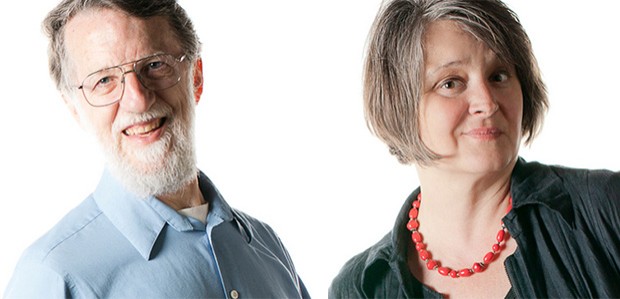Researchers receive $5.5M to lead projects with major social impact
 Concordia researchers William Reimer and Kim Sawchuk. | Photos by David Ward
Concordia researchers William Reimer and Kim Sawchuk. | Photos by David Ward
Two Concordia professors have received a total of $5.49 million in federal funding from the Social Sciences and Humanities Research Council (SSHRC) as the lead researchers of two multi-institutional international research projects.
The grants come from the Partnership Grants initiative, which helps advance knowledge and understanding on critical issues of intellectual, social, economic and cultural significance.
- Ageing, Communication, Technologies (ACT) is the first large-scale initiative of its kind to address the transformation of the experiences of aging in networked societies.
- The Rural Policy Learning Commons (RPLC) will help make policy-makers more conscious of the characteristics, unique benefits and challenges associated with rural and northern places.
Read more about the two grants below.
Ageing, Communication, Technologies (ACT)
Kim Sawchuk, a professor in Concordia’s Department of Communication Studies and a director of the department’s Mobile Media Lab, has received a partnership grant of $2.99 million from SSHRC. Her seven-year project, Ageing, Communication, Technologies (ACT): Experiencing a Digital World In Later Life, is the first large-scale initiative of its kind to address the transformation of the experiences of aging in networked societies.
“What makes this research project special is that it doesn’t reduce aging to health issues,” says Sawchuk, who is the grant’s principal investigator. Along with the project’s co-founders, Mireia Fernández-Ardèvol, a researcher from the Internet Interdisciplinary Institute (IN3), a research centre of the Open University of Catalonia (Spain); Barbara Crow, the interim dean and associate vice-president of York University’s graduate program in Communication and Culture; and Line Grenier, professor in the department of communication at Université de Montréal, Sawchuk is bringing together 12 universities, seven research institutes, seven community partners, 17 co-applicants and 18 collaborators.
“We discovered that older adults are happy to discuss something other than their health, their poverty, their social housing problems, and they want to be asked what it’s like to live in a digital world,” says Sawchuk. “But we don’t start with the assumption that if you’re old, you’re deficient or a late adopter. Our objective with ACT is to consider how digital ageism operates in subtle ways and to suggest strategies for change.”
With the international research team behind ACT, Sawchuk hopes to transform public discourse about aging while including older adults as active agents and collaborators in the research agenda. ACT will develop curricula and provide a lasting collaborative platform for the theorization and critical analysis of the relationship between aging and digital worlds.
“It’s important for us to incorporate seniors into the project, so we’re working with groups like RECAA (Respecting Elders: Communities Against Abuse), who do forum theatre,” says Sawchuk. “We’re investigating topics such as how to collect more relevant statistics for older adults who are usually lumped into one category over 50, and how listening to music is changing for older adults because of changes in digital distribution through iTunes.”
ACT will achieve these goals through creative collaborations and exhibitions with older adults, as well as virtual seminars, summer schools, face-to-face network meetings and pilot projects that investigate new research questions, concepts and knowledge production. A robust new website will disseminate results, reports and upcoming events.
“We’re highly interested in what it means to live in a networked society as you age,” says Sawchuk, who bristles at the negative connotation behind the term “grey tsunami.”
“We live in a culture where there are too many assumptions about older people being digitally incompetent or disinterested, but it’s not true. There are many grandparents who want to learn how to text message to stay in the loop with their grandchildren. Motivation to keep connected is a powerful driver.”
The Rural Policy Learning Commons (RPLC)
William Reimer, Professor Emeritus in Concordia’s Department of Sociology and Anthropology and adjunct professor at Brandon University (BU), has received a partnership grant of $2.5 million from SSHRC. He will lead the Rural Policy Learning Commons (RPLC), a seven-year project based at BU that will help make policy-makers more conscious of the unique characteristics, benefits and challenges associated with rural and northern communities.
With funding from more than a dozen partners alongside SSHRC, RPLC is an international project with a total of $5.2 million in funding, meant to strengthen the voices of rural and northern populations. It brings together an existing global network of 90 institutional and individual participants, which will grow significantly as the partnership expands to include more countries, regions, and communities.
“Rural regions and urban centres remain connected through their labour needs, food production, resource development, and energy demands,” says project manager Bill Ashton, who is also director of BU’s Rural Development Institute. “The RPLC will engage urban-based policy decision-makers with rural-focused challenges, opportunities, and aspirations. The goal is to create conditions that are supportive of vibrant communities and economies everywhere.”
Reimer — who has spent the past four decades exploring exclusion and inclusion in rural areas, the informal economy, and relations between rural and urban people and institutions — travelled to BU, in Brandon, Manitoba, for the grant announcement.
“I’m particularly excited about this grant because RPLC allows us to explore innovations in international collaboration. Since it is almost impossible to get all our participants in the same place at the same time, we are forced to find ways to collaborate across vast differences and multiple time zones,” he says, noting that he is proud to be working with Concordia colleagues Natasha Blanchet-Cohen, Satoshi Ikeda, Monica Mulrennan, Peter Stoett and Mark Watson on the project.

